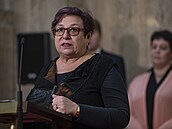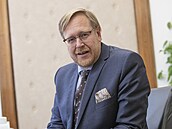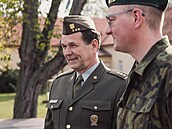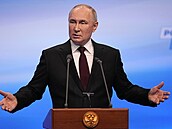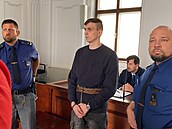The Czech political scene is abuzz over a grand mystery. Who leaked the telephone conversations of ex-Prague mayor Pavel Bém (Civic Democrats, ODS) and controversial lobbyist Roman Janoušek to the media? Czech Position examines the clues and motives. From the endless set of options and following dozens of meetings with politicians, people from the security community, senior government officials and businessmen, five names and constructions have taken shape.
Former spies Václav Jahodář and Karel Randák, now an anticorruption crusader, and Prague “godfathers” Ivo Rittig and Tomáš Hrdlička, along with Jan Novák (right-hand man to a former ODS prime minister) were all named as possible “snitches.” And that is certainly not a complete list of people or organizations following some political goal by providing Mladá fronta Dnes (MfD), the weekly Euro and, later, Aktualne.cz’s daily Insider with the secret recordings. We add that Czech Position had no access to any classified information and only used personal contacts and open sources.
Naturally enough, during the investigation we came across those who were merely fabricating lies. But it is likely that amongst this information there were hard facts. We consider the most important thing is that we managed to highlight the way Czech politicians, businessmen and influential officials decide who is friend and who is foe. Only the media that reported the phone tapping or the authorities active in criminal proceedings can confirm the veracity of our findings. Because we respect the right of journalists to keep their sources anonymous, we didn’t ask them where they got their information from.
A spy in politics
No intrigue involving the Czech secret service is complete without a spy, or intelligence operative. We have three. One of them is Václav Jahodář, who worked for
The reason? The party’s self-described “super-guru,” Vít Bárta, could try to distract attention from his bribery case (he was convicted last week); likewise it would tarnish the political competition. According to MfD, the first to publish the Bém-Janoušek recordings from 2007, the newspaper acquired the records from a security agency, ABL (founded by Bárta), which apparently received them from
Jahodář, who left
However, Jahodář does not hide his good relations with VV. “I think it was Michal Moroz [former deputy to then interior minister Radek John, and a business partner of ABL] who offered me cooperation with VV or something similar. I went into this with ideals,” he said, remembering the start of his cooperation with VV. Nor did he deny contacts at his former workplace. “I meet Jiří Lang (the BIS director), about twice a year,” added Jahodář. Rumors about his role in the leaking of recordings from
Forever with the presidents
Construction number two points out a link to the presidential election. Jan Fischer, the former prime minister of the caretaker government and the current Vice President of the European Bank for Reconstruction and Development (EBRD), is running for president (and leading the polls). His campaign relies on Jan Novák, former director of the Office of the Government during Mirek Topolánek’s (ODS) reign as prime minister and, until February 2012, deputy director of the National Security Authority (NBÚ). It is Novák, who, as the head of the Office of the Government, acted as a link between the head of
“The recordings damage ODS the most. But they also impugn all political parties. Anyone who is outside of a party is suddenly okay. Thus, Jan Novák could provide a great service to Fischer,” an ODS MP, who did not wish to be named, told Czech Position.
For years now, Jan Novák has moved close to senior politicians. He worked in the Presidential Office of both Václav Havel and current president Václav Klaus and knows how important intelligence information can be in political battles. The battle for Klaus’ successor to Prague Castle starts this year. It is mostly party-men who are standing. Jan Fischer, however, has gambled on being an independent. “I’m going to run as an independent and non-party candidate, I'm going to collect 50,000 signatures by petition. I won’t be a party candidate and won’t be receiving campaign funds from any political party,” he told the business daily Hospodárske noviny in February. The discrediting of political parties, and hence their presidential candidates, would, of course, improve his chances for the presidency.
Although the eavesdropping affair primarily affects the ruling center-right ODS, the main opposition Social Democrats (ČSSD) are not without blemishes: Prague representative Petr Hulinský has been mentioned in the published conversations. And given the earlier Grand Coalition at Prague City Hall between ODS and ČSSD, it can be assumed that the (hitherto unpublished) recordings of Janoušek's phone calls could hold more explosive information concerning ČSSD. In any event, media coverage of the intelligence reports, which Novák may have available, would help Fischer.
Without assuming that the possible mastermind of the leak would own up, we confronted Jan Novák with this version. Understandably, he denied it. Nor did he comment on the construction concerning his new involvement with Fischer.
A clash over Prague Airport
We will add one more important link. Novák is close to Mirek Topolánek’s former adviser Marek Dalík. The two studied together, working as trainees in Prague Castle for Václav Havel and, reportedly, they own flats in an apartment block in Spindlerův Mlyn.
According to their statement, the leaking of sensitive talks between Bém and Janoušek did not bother Dalík or Topolánek. The content of the recordings confirmed the words of the former ODS head, who spoke of the need to purge the party of “governors” and “godfathers” at the ODS Congress in 2009. On the contrary, the recording damaged Bém the most, who stood against Topolánek for the post of ODS chairman in 2008.
Both politicians and their éminence grise, Janoušek and Dalík, clashed once again, that being in 2007 during the preparations for transforming Prague Airport into a joint stock company. Bém and Janoušek reputedly lobbied so that Prague acquired a third of the shares, but Topolánek and Dalík rejected this.
A spy outside the service
A lot has been written about Karel Randák, the former
During the Czech public television program “Question Time with Václav Moravec” broadcast on April 1, the prime minister commented on the leak of Janoušek's secret conversations, published on the Euro.cz web, with the following: “There is much to suggest that even the people and the contents were mixed up. Apparently Mr. Randák got it wrong and identified it incorrectly.” The initial confusion of persons was confirmed, though Nečas did not provide any evidence for Randák's part. “Even I can use exaggeration. I have plenty of reasons to think so,” added Nečas, who, according to our information, is convinced that Randák is trying his utmost to discredit the ODS.
Randák's crusade against the ODS?
The ODS blames Randák for the leaks on Jana Nagyová's wages, the director of Nečas's Cabinet. They suspect him of long-term contacts with ČSSD and blame him for making the Savoy case public (a video from the meeting of the lobbyist Miroslav Šlouf with Václav Klaus’ head of the Presidential Office, Jiří Weigl, before the presidential election in 2008). Apparently, he was also involved in publishing the photos from Mirek Topolánek’s holiday in the Tuscan resort of Monte Argentario.
We must add that ex premiere Topolánek refused to go before the Parliamentary Commission for the Control of the
Randák has a real reason to be angry with ODS. With the arrival of Topolánek's government Ivan Langer (ODS) became Interior Minister in 2006 and began the initiative to merge
Still, there is also the suspicion that someone's trying to systematically discredit Randák. Since participating in the work of Karel Janeček's Anti-corruption Endowment (NFPK), which exposes corruption in the Czech Republic, he has become a persona non grata for politicians and lobbyists. Randák assisted NFPK when untangling the information about the millions from overpriced tickets for Prague public transport company (DPP), which, according to NFPK, ended up in the accounts of the influential entrepreneur and éminence grise of ODS Central Bohemia Ivo Rittig.
After Nečas's recent TV appearance, Randák didn't hide his grievance. In his opinion, the prime minister went beyond the pale when he accused him on live TV of being the person who leaked the documents. “It ruined my weekend at the cottage. All the journalists called to ask if it is true. It's absolute nonsense, and the prime minister said it without giving one piece of evidence. He could have at least said that he has information on it, but can't give it away due to its sensitivity. But he didn't even do that,” Randák told Czech Position. He doesn’t intend to defend himself in court, according to him there is no point in the Czech Republic. However, he is thinking about other ways to defend himself. He didn’t want to divulge the details.
Did Rittig or Hrdlička tailor it?
Due to revealing the unusual contractual relations of the Prague Public Transport Company, which the new management of Prague City Hall has started, there could be an interest to “divert” attention away from Ivo Rittig. So produce a new affair, especially when it concerned Janoušek, another influential Prague lobbyist. According to a trusted Czech Position source, Rittig also has very good contacts with the police. Theoretically, he could have access to the recordings the police made for
Thus Czech Position tried to get in touch with Rittig to ask him if he initiated the leaks. But he failed to respond to our questions.
Another influential businessman and member of the ODS in Prague 10, Tomáš Hrdlička, was more forthcoming. He too has been repeatedly talked about in the media as the possible initiator of the leak, by which he tried to definitively break the Bém-Janoušek duo from its influence on Prague politics and business.
Hrdlička wrote an SMS to Czech Position: “I don’t know anything about it as I’m in the southern hemisphere and, thankfully, the internet services are not great here. The only thing that I can say is that these are ravings and I probably belong to those few people who still say that Roman Janoušek is one of my friends. It is amusing to see how no one knows and never actually knew Roman Janoušek. In the words of a classic: It’s a fake. P.S. The easiest way is to ask Mr. Kmenta. But I’ll leave it to you, because he is not in my fan club.”
So what next?
The publication of the five-year-old wiretaps brought considerable turmoil to Czech politics. No one, except completely minor politicians, can be sure that evidence won’t be published about their past communications with Janoušek. Neither politicians nor those in Prague Castle can be certain. Their nervousness is increased by the fact that no one knows what other recordings could be leaked, who is holding them and what they will further release to the media.
The climate of fear has virtually paralyzed Czech politics. No one cares what is behind the leaks. Thanks to the literary activities of the controversial journalist Adam B. Bartoš and the constructions, we have learned that the affair was apparently “ordered” by Prague Mayor, Bohuslav Svoboda, due to the attempt by billionaire Tomáš Chrenek to gain control of four Prague hospitals, which Janoušek had designs on. In the tangle of the constructions, politicians, but most of all the public, should insist on a thorough examination of three key issues:
- Who carried the sensitive information?
- Why did no one take it up in the past?
- And if they did, how did the unveiling of the links between Janoušek and the Czech political elite turn out?
This does not affect the duty to deal with the actual content of the wiretaps. Instead of answers, however, the politicians have only given us mutual accusations without evidence.


